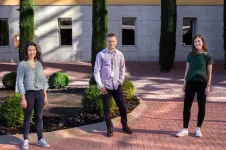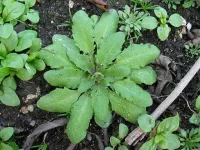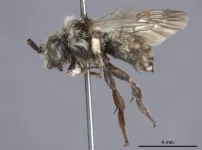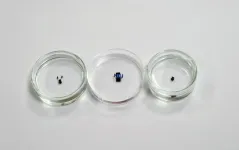(Press-News.org) Chemotherapy kills tumour cells by causing damage to them. One of the most effective ways of causing damage is to prevent the two DNA strands from separating so that the cellular machinery cannot read the instructions written in the genes. But sometimes, the cell manages to repair the damage and survive, evading the effect of chemotherapy. CNIO researchers have found out how the cell does that and plan to use this knowledge to enhance cancer treatments.
The key lies in a peculiar protein called PrimPol, as explained in a publication in The EMBO Journal by the CNIO's DNA Replication Group, led by Juan Méndez.
The DNA molecule harbours the genes that direct the life of the cell and, by extension, the life of the whole organism. It consists of two intertwined strands, the famous double helix. For the instructions written in the genes to be read by the cellular machinery, the two strands of DNA must be pulled apart and put back together again, like a zipper that opens and closes. If this does not happen, the cell cannot function and, of course, cannot replicate.
That is why lesions that prevent DNA strands from separating are among the most serious that a cell can suffer. They are called interstrand cross-links (ICLs). ICL lesions can appear naturally, as a result of cell metabolism, or as a consequence of certain toxins, such as chemotherapeutic drugs. Cisplatin, used in the treatment of among others ovarian and lung cancers, kills tumour cells by inducing ICL lesions.
A 'staple' that holds the double helix together
As Méndez explains, "The ICL is a chemical bond between the two strands, a kind of staple that prevents them from separating. If the cell tries to divide, the chromosomes end up breaking."
The cell, however, knows how to repair these lesions, which in fact only become lethal when their frequency is very high. In the paper now published in The EMBO Journal, the CNIO group reveals that the cell achieves this in part thanks to PrimPol.
PrimPol belongs to a family of proteins called "primases" that appeared very early in the evolution of life and is still present today in a great many species, which indicates its importance for the functioning of organisms. In 2013, Juan Méndez and Luis Blanco, from the Centro de Biología Molecular Severo Ochoa (CSIC), discovered why PrimPol is so important: it allows the cellular machinery to use the instructions written in the DNA even when it contains an error. In other words, PrimPol makes the cell more resilient by helping it to survive when its DNA is damaged.
PrimPol helps to keep reading the DNA
Usually, DNA-copying proteins are blocked when they detect defects in the double helix, and if the blockage persists for too long, the cell will die. But PrimPol enables the reading of the DNA to continue after the error, like keeping on reading a text after skipping a misspelt or misunderstood word. "PrimPol," explains Méndez "offers 'an immediate solution' to bypass the blockage, giving the cell a chance to repair the error in the DNA at a later time."
The new study focuses on PrimPol's function when the error is an ICL lesion. The researchers found that PrimPol is required for the DNA copying phase that precedes the repair of the staple in the DNA strands. Thanks to the intervention of this enzyme, the cell not only survives ICL lesions but also mobilises the machinery responsible for repairing them.
Repressing PrimPol to potentiate chemotherapy
It is a basic finding, but "with very interesting clinical implications," says Méndez, because "by facilitating the repair of ICLs, PrimPol is interfering with the effectiveness of chemotherapy."
That suggests that if PrimPol were absent, the tumour cell would be more sensitive to chemotherapy. The authors, therefore, believe that the new results "open the possibility of targeting PrimPol to enhance the therapeutic effects of molecules that produce ICL lesions," they write in The EMBO Journal.
In another recent study in which Méndez participated together with researchers from Washington University (St Louis, USA), it was found that ovarian tumour cells produce more PrimPol to tolerate DNA damage caused by cisplatin-based chemotherapy.
"If we can repress PrimPol function in these cells, we could improve the efficiency of chemotherapy," Méndez points out. To this end, his team is working together with CNIO's Experimental Therapeutics Programme to identify specific PrimPol inhibitors.
Fanconi anaemia
The new study is also of interest for Fanconi anaemia, a rare and severe disease. The CNIO researchers show that PrimPol facilitates the repair of ICL lesions by a family of proteins called FANC. And genetic defects that reduce the activity of these proteins cause Fanconi anaemia.
"Patients with Fanconi anaemia have very few therapeutic options, but very promising results are beginning to be obtained with gene therapy," says Méndez. "Any advances that lead to a better understanding of the ICL repair pathways may prove useful in the near future."
INFORMATION:
The experimental work was carried out by three PhD students supervised by Méndez: Daniel González, Elena Blanco and Patricia Ubieto. Luis Blanco, a CSIC scientist, Massimo Lopes, a scientist at the University of Zurich (Switzerland), and the CNIO Proteomics Core Unit also participated.
The research has been funded by the Spanish Ministry of Science and Innovation, the National Institute of Health Carlos III, the European Regional Development Fund., the Swiss National Science Foundation and the European Research Council.
The University of Ottawa has been awarded four new Canada Research Chairs (CRC) that will strengthen its expertise in artificial intelligence, health and law. The University is also proud to announce the renewal of two CRCs that will conduct leading-edge research in quantum communications and photonics.
"The Canada Research Chairs Program provides invaluable support to our researchers as they forge their paths of discovery at a world-class level," said Sylvain Charbonneau, vice-president, research. "The results of this most recent competition will ...
A review of more than 9,000 U.S. patients with severe COVID-19 infection showed less than 1% contracted the illness again, with an average reinfection time of 3.5 months after an initial positive test. Those are the findings from a study conducted by researchers from the University of Missouri School of Medicine and MU Health Care.
The researchers teamed up with the MU Institute for Data Science and Informatics and the Tiger Institute for Health Innovation to review data from 62 U.S. health care facilities. They found 63 of the 9,119 patients (0.7%) with severe COVID-19 infection contracted the virus a second time, with a mean reinfection period of 116 days. Of the 63 who were reinfected, two (3.2%) died. Patients categorized as ...
Plants evolve specialised defence chemicals through the combined effects of genes, geography, demography and environmental conditions, a study published today in eLife reports.
The findings reveal a pattern in the types of defence chemicals plants produce across Europe, and describe some of the evolutionary processes that create them.
As plants are immobile organisms, they rely on producing defence chemicals called specialised metabolites for survival. Specialised metabolites have extensive variation in their structure, such as the number of carbon molecules ...
June 15, 2021 - Canadian researchers have discovered that a bee thought to be one of the rarest in the world, as the only representative of its genus, is no more than an unusual specimen of a widespread species.
Scientists with the Canadian Museum of Nature (CMN) and York University have reclassified the mystery bee, collected somewhere in Nevada in the 1870s, as Brachymelecta californica. They note that it's an aberrant individual of a species, the California digger-cuckoo bee, that is part of a group that includes five other species. All are cleptoparasitic bees, with females that lay eggs in the nests of digger bees. Brachymelecta californica itself is known to be widespread ...
A recent UCLA clinical trial has shown encouraging results in helping daily smokers who are also heavy drinkers quit smoking and cut down their alcohol intake.
The study of 165 people tested two prescription drugs -- varenicline, for smoking addiction, and naltrexone, which is used to treat alcoholism. Studies have shown that varenicline, marketed under the brand name Chantix, may also be effective in reducing alcohol consumption.
Participants, who ranged in age from 21 to 65, smoked at least five cigarettes a day, with male participants generally consuming more than 14 drinks a week and women more than seven per week.
Over the 12-week study period, each participant received 2 milligrams of varenicline twice a day. Roughly half the group -- 83 participants -- also received a 50-milligram ...
Hippopotamus aren't the first thing that come to mind when considering epidemiology and disease ecology. And yet these amphibious megafauna offered UC Santa Barbara ecologist Keenan Stears(link is external) a window into the progression of an anthrax outbreak that struck Ruaha National Park, Tanzania, in the dry season of 2017.
Through surveys and GPS monitoring, Stears and his colleagues, Wendy Turner, Doug McCauley and Melissa Schmitt, revealed that reduced dry-season flows in the Great Ruaha River indirectly spread the disease by affecting hippo movement. The results, which appear in the journal Ecosphere(link is external), present a unique perspective on disease ecology and illustrate how anthropogenic changes can impact wildlife and human health.
The ...
A team of scientists at Nanyang Technological University, Singapore (NTU Singapore) has developed millimetre-sized robots that can be controlled using magnetic fields to perform highly manoeuvrable and dexterous manipulations. This could pave the way to possible future applications in biomedicine and manufacturing.
The research team created the miniature robots by embedding magnetic microparticles into biocompatible polymers -- non-toxic materials that are harmless to humans. The robots are 'programmed' to execute their desired functionalities when magnetic fields are applied.
The made-in-NTU robots improve on many existing small-scale robots by optimizing their ability to move ...
Is artificial intelligence the key to preventing relapse of severe mental illness?
New AI software developed by researchers at Flinders University shows promise for enabling timely support ahead of relapse in patients with severe mental illness.
The AI2 (Actionable Intime Insights) software, developed by a team of digital health researchers at Flinders University, has undergone an eight-month trial with psychiatric patients from the Inner North Community Health Service, located in Gawler, South Australia.
The digital tool is tipped to revolutionise consumer-centric timely mental health treatment provision outside hospital, with researchers labelling it as readily available and scalable.
In the trial of 304 ...
Exposure to the rhinovirus, the most frequent cause of the common cold, can protect against infection by the virus which causes COVID-19, Yale researchers have found.
In a new study, the researchers found that the common respiratory virus jump-starts the activity of interferon-stimulated genes, early-response molecules in the immune system which can halt replication of the SARS-CoV-2 virus within airway tissues infected with the cold.
Triggering these defenses early in the course of COVID-19 infection holds promise to prevent or treat the infection, ...
Researchers from The Australian National University (ANU) have developed new technology that allows people to see clearly in the dark, revolutionising night-vision.
The first-of-its-kind thin film, described in a new article published in Advanced Photonics, is ultra-compact and one day could work on standard glasses.
The researchers say the new prototype tech, based on nanoscale crystals, could be used for defence, as well as making it safer to drive at night and walking home after dark.
The team also say the work of police and security guards - who regularly employ night vision - will be easier and safer, reducing chronic neck injuries from currently bulk night-vision devices.
"We have made the invisible visible," lead researcher Dr Rocio Camacho Morales said. ...






